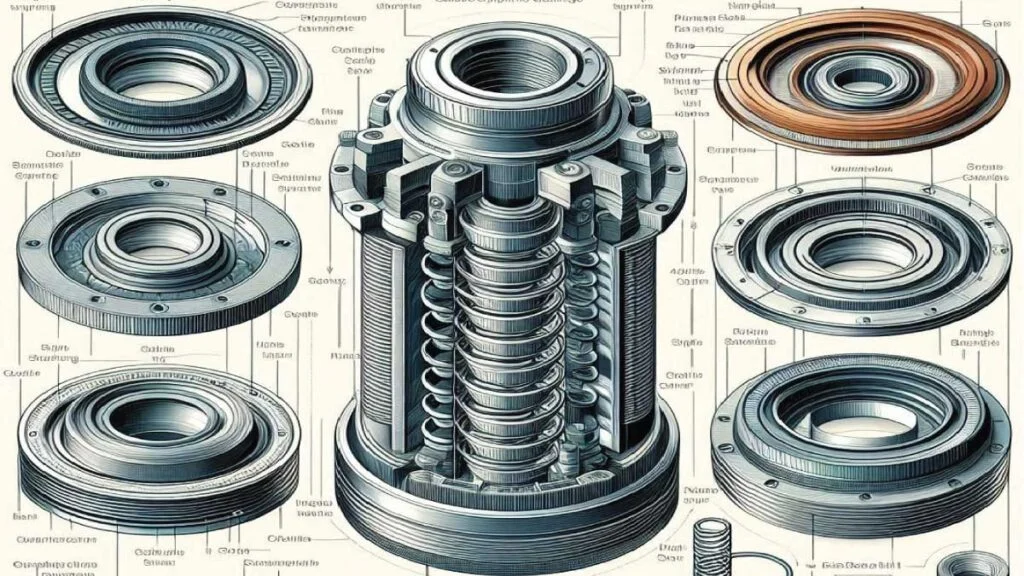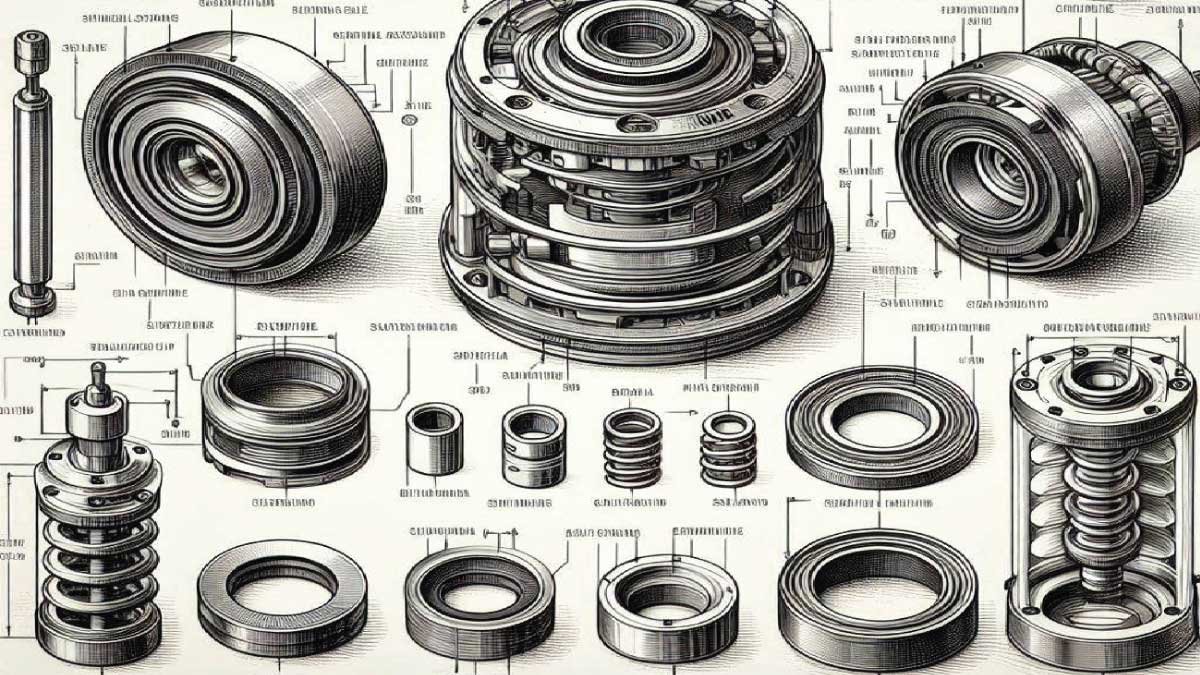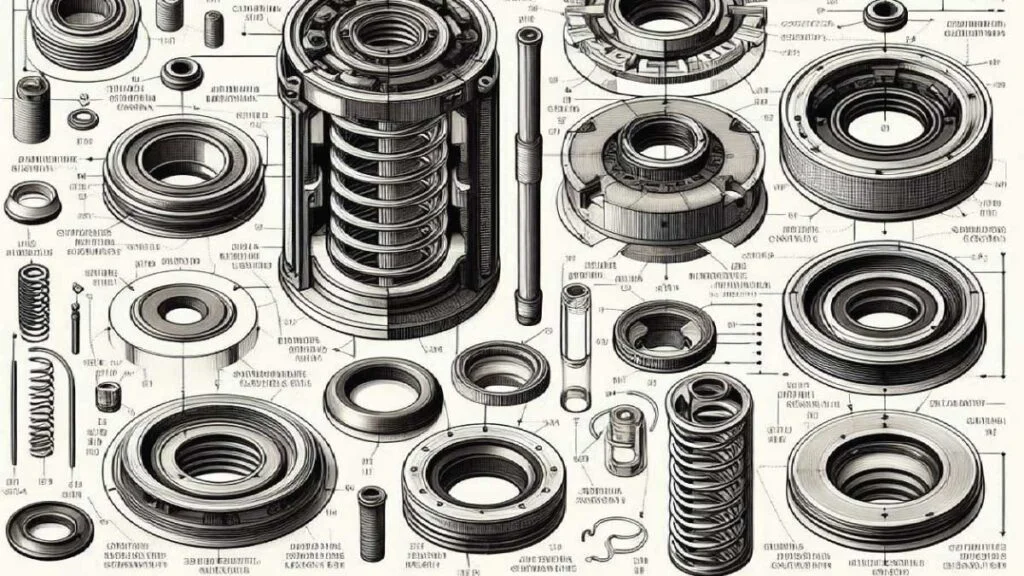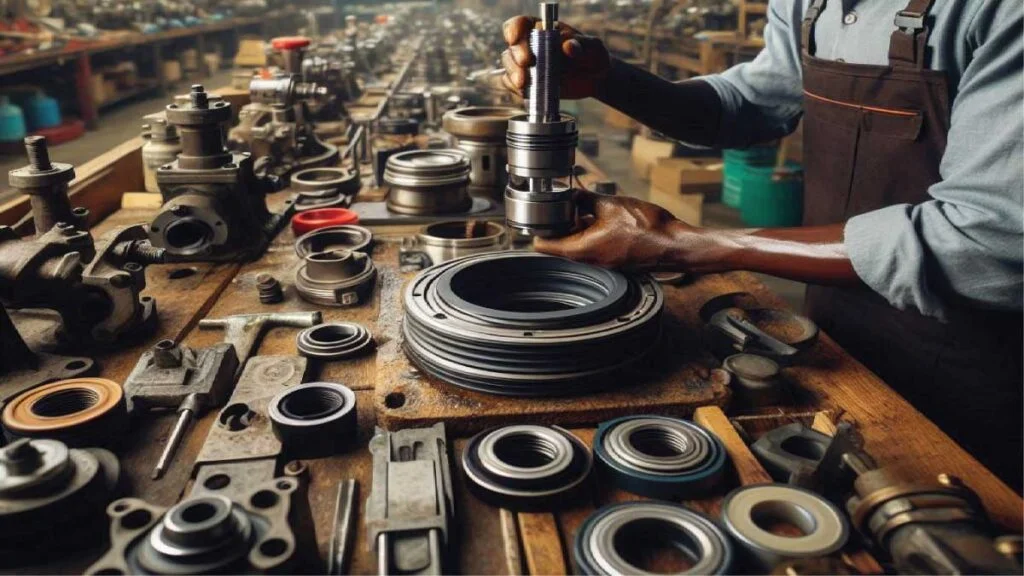Mechanical seals play a crucial role in the efficiency and longevity of pumps. They prevent leaks, maintain pressure, and ensure that the pumps function smoothly. The goal of this post is to highlight the best types of mechanical seals for pumps, helping you choose the right seal for your needs. We will discuss what mechanical seals are, their importance in pumps, the criteria for selecting them, and the top 10 types of mechanical seals for pumps. By understanding these aspects, you can make informed decisions that enhance the performance and reliability of your pumping systems. Proper selection and maintenance of mechanical seals for pumps are vital for optimal pump operation and longevity.
Understanding Mechanical Seals
Mechanical seals are devices that join systems or mechanisms together, preventing leakage, containing pressure, and excluding contamination. These seals are essential components in various types of machinery, especially in pumps. Their primary function is to prevent the fluid being pumped from leaking out between the rotating shaft and the stationary pump casing.
Mechanical Seals for Pumps are designed to ensure the efficiency and longevity of the pump by providing a reliable seal. They come in various types and materials, each suited for different applications and operating conditions. By preventing leaks, mechanical seals help maintain the required pressure within the pump, which is crucial for its optimal performance.
Importance of Mechanical Seals in Pumps
The importance of mechanical seals for pumps cannot be overstated. Without a proper seal, pumps are prone to fluid leaks, which can lead to significant equipment damage and operational downtime. Leaks not only waste valuable fluids but also can cause corrosion and wear on the pump components, leading to costly repairs and replacements. Additionally, leaks can pose safety hazards, especially when dealing with hazardous or toxic fluids.
Mechanical seals also play a vital role in maintaining the efficiency of pumps. By keeping the fluid contained and maintaining the necessary pressure, seals ensure that the pump operates at its intended performance levels. This efficiency translates to lower energy consumption and reduced operational costs over time. Furthermore, well-maintained mechanical seals can extend the lifespan of pumps, reducing the frequency of maintenance and the associated costs.
In summary, understanding mechanical seals for pumps is essential for anyone involved in the maintenance and operation of pumping systems. These seals are critical for preventing leaks, maintaining pressure, and ensuring the efficient operation of pumps. By choosing the right type of mechanical seal and ensuring regular maintenance, you can significantly enhance the performance and reliability of your pumps, ultimately leading to longer equipment life and reduced operational costs. Proper selection and upkeep of mechanical seals are fundamental to achieving optimal pump performance and ensuring smooth and uninterrupted operation in various industrial applications.
Criteria for Selecting Mechanical Seals for Pumps
Choosing the right mechanical seals for pumps is essential to ensure optimal performance, reliability, and longevity. Several key criteria must be considered to make the best selection.
Pressure and Temperature
The pressure and temperature conditions of the pump environment are crucial factors when selecting mechanical seals for pumps. Different seals are designed to handle various levels of pressure and temperature. For high-pressure applications, seals made from robust materials such as tungsten carbide or silicon carbide are often preferred. In contrast, for lower pressure conditions, less durable materials may suffice. Temperature also plays a significant role; seals must be able to withstand the maximum operating temperatures of the pump. High-temperature environments might require seals made from materials like carbon or advanced ceramics to maintain integrity and functionality.
Fluid Type
The type of fluid being pumped is another critical consideration. Different fluids have varying levels of corrosiveness, abrasiveness, and viscosity, which can affect the seal’s performance. For instance, mechanical seals for pumps handling corrosive fluids like acids or alkalis need to be made from materials that resist corrosion, such as Hastelloy or PTFE. Abrasive fluids, on the other hand, require seals that can withstand wear, typically made from materials like silicon carbide or ceramic. Ensuring compatibility between the seal material and the fluid being pumped is essential to maintain the seal’s integrity and prolong its service life.
Operational Conditions
Operational conditions, including pump speed, environmental factors, and maintenance requirements, also influence the selection of mechanical seals for pumps. High-speed pumps demand seals that can handle rapid rotations without losing efficacy, often utilizing advanced designs and materials. Environmental conditions, such as exposure to dust, chemicals, or moisture, require seals that can endure these elements without degrading. Additionally, understanding the maintenance needs of your pump system can help in selecting seals that are easier to install, inspect, and replace. Regular maintenance and adherence to best practices are vital for extending the lifespan of mechanical seals and ensuring continuous, efficient pump operation.
In summary, selecting the right mechanical seals for pumps involves considering pressure and temperature conditions, fluid type, and operational factors. By carefully evaluating these criteria, you can choose a mechanical seal that will enhance your pump’s performance and reliability, ultimately leading to longer equipment life and reduced maintenance costs.
The 10 Best Types of Mechanical Seals for Pumps

1. Pusher Types of Mechanical Seals for Pumps
Description:
Pusher mechanical seals use springs or bellows to push the sealing faces together, maintaining the necessary contact pressure. This design allows for adjustment to axial movement and wear, making them suitable for varying pressure and temperature conditions. The ability to self-adjust for wear makes these seals highly versatile, ensuring continuous, efficient operation.
Advantages:
The primary advantage of pusher mechanical seals for pumps is their versatility. They can adapt to different pressure and temperature conditions, making them reliable in a variety of applications. Their ability to compensate for wear over time reduces maintenance needs and extends the seal’s service life.
Applications:
Pusher mechanical seals are commonly used in pumps, mixers, and compressors across various industries. They are particularly useful in applications where varying operational conditions are expected, such as in water treatment plants, chemical processing, and oil refineries.
2. Non-Pusher Types of Mechanical Seals for Pumps
Description:
Non-pusher mechanical seals, also known as bellows seals, use a flexible bellows assembly instead of springs to maintain face contact. This design eliminates the need for dynamic secondary seals, reducing the risk of leakage. The bellows provide flexibility and can handle axial movements without the drawbacks of traditional pusher designs.
Advantages:
The absence of dynamic secondary seals in non-pusher mechanical seals for pumps significantly reduces the risk of leakage. Their flexibility makes them ideal for handling corrosive or abrasive fluids, as the bellows can accommodate movements and adjustments without compromising the seal.
Applications:
Non-pusher mechanical seals are ideal for chemical processing and petrochemical industries. They excel in environments where fluids are highly corrosive or abrasive, ensuring long-term reliability and minimal leakage.
3. Cartridge Types of Mechanical Seals for Pumps
Description:
Cartridge mechanical seals are pre-assembled units that simplify installation and maintenance. They come as a complete package, including the seal, gland, and sleeve, reducing the risk of installation errors. This design ensures that the seal is properly aligned and that all components are correctly fitted.
Advantages:
The ease of installation and maintenance is the primary advantage of cartridge mechanical seals for pumps. They reduce the time required for maintenance and the potential for errors during installation. This results in improved reliability and less downtime.
Applications:
Cartridge mechanical seals are widely used in industries such as oil and gas, water treatment, and food processing. Their design makes them particularly valuable in applications where quick and reliable maintenance is critical to operational efficiency.
4. Balanced Types of Mechanical Seals for Pumps
Description:
Balanced mechanical seals are designed to handle higher pressures and reduce the closing force on the seal faces, extending their lifespan. This is achieved by balancing the hydraulic pressure within the seal, which distributes the forces more evenly and reduces wear.
Advantages:
Balanced mechanical seals for pumps are suitable for high-pressure applications. Their design reduces wear on the seal faces, leading to a longer service life. They are particularly effective in environments where high-pressure conditions are constant, ensuring reliable operation.
Applications:
Balanced mechanical seals are ideal for high-pressure pumps, compressors, and reactors. They are often used in industries such as power generation, chemical processing, and high-pressure fluid transport.
5. Unbalanced Types of Mechanical Seals for Pumps
Description:
Unbalanced mechanical seals are simpler in design and typically used for lower-pressure applications. They rely on the fluid pressure to create the necessary closing force on the seal faces. This simplicity makes them easier to install and maintain.
Advantages:
The main advantages of unbalanced mechanical seals for pumps are their cost-effectiveness and ease of installation. They are straightforward to use and maintain, making them a practical choice for less demanding applications.
Applications:
Unbalanced mechanical seals are commonly used in water pumps and low-pressure chemical pumps. They are suitable for applications where the pressure conditions are moderate, and the operational environment does not require the advanced capabilities of more complex seals.
6. Single Types of Mechanical Seals for Pumps
Description:
Single mechanical seals feature a single set of sealing faces, creating a single barrier to prevent fluid leakage. They are straightforward to install and maintain, making them a popular choice for many applications. The simple design of these seals ensures ease of use and reliability, making them suitable for various operational conditions.
Advantages:
The primary advantages of single mechanical seals for pumps are their simple design and easy maintenance. These seals are effective for a wide range of applications, providing reliable sealing performance without the complexity of more advanced seal types. Their simplicity translates to lower maintenance costs and straightforward installation procedures.
Applications:
Single mechanical seals are used in pumps, mixers, and agitators across industries such as water treatment, food and beverage, and chemical processing. Their straightforward design makes them an ideal choice for applications where reliability and ease of maintenance are essential.
7. Double Types of Mechanical Seals for Pumps
Description:
Double mechanical seals, also known as dual seals, feature two sets of seal faces to provide additional protection against leakage. They can be arranged in tandem or back-to-back configurations, offering enhanced reliability and sealing performance. This design ensures that even if the primary seal fails, the secondary seal will prevent fluid leakage.
Advantages:
Double mechanical seals for pumps offer enhanced reliability and extra protection against leaks. They are particularly suitable for handling hazardous or toxic fluids, where leakage prevention is critical. The dual-seal design also makes them suitable for high-pressure environments and applications where product purity is essential.
Applications:
Double mechanical seals are used in critical applications in hazardous fluid handling, high-pressure environments, and industries where maintaining product purity is crucial. They are commonly found in chemical processing, pharmaceutical manufacturing, and oil and gas industries.
8. Dry Gas Types of Mechanical Seals for Pumps
Description:
Dry gas mechanical seals are designed for use in gas applications, where traditional liquid seals would not be effective. They use a gas barrier to prevent leakage, providing efficient sealing performance without the need for liquid lubricants. This design minimizes friction and wear, making them suitable for high-speed applications.
Advantages:
The key advantages of dry gas mechanical seals for pumps are their minimal friction, reduced wear, and suitability for high-speed applications. They provide reliable sealing performance in gas environments, ensuring long-term operation with minimal maintenance.
Applications:
Dry gas mechanical seals are used in compressors, gas turbines, and other high-speed rotating equipment. They are particularly valuable in industries such as natural gas processing, petrochemicals, and aerospace, where reliable gas sealing is essential.
9. Elastomeric Bellows Types of Mechanical Seals for Pumps
Description:
Elastomeric bellows mechanical seals use a flexible elastomer bellows as the secondary sealing element, providing excellent flexibility and ease of installation. The elastomeric bellows can accommodate shaft movements and vibrations, ensuring a reliable seal even in challenging conditions.
Advantages:
The flexibility and ease of installation are the main advantages of elastomeric bellows mechanical seals for pumps. They are resilient to shaft movements and vibrations, making them suitable for dynamic applications. These seals require minimal maintenance and offer reliable performance.
Applications:
Elastomeric bellows mechanical seals are commonly used in pumps and mixers handling water, chemicals, and other fluids. Suitable materials for these seals include Nitrile, EPDM, and Viton, chosen for their chemical compatibility and durability.
10. Metal Bellows Types of Mechanical Seals for Pumps
Description:
Metal bellows mechanical seals use a metallic bellows as the secondary sealing element, providing excellent resistance to high temperatures and pressures. The metallic bellows can withstand harsh operating conditions, making these seals ideal for demanding applications.
Advantages:
The superior strength, corrosion resistance, and ability to withstand harsh conditions are the primary advantages of metal bellows mechanical seals for pumps. They offer extended service life and reliability, ensuring efficient operation in extreme environments.
Applications:
Metal bellows mechanical seals are essential in high-temperature and high-pressure sealing capabilities for industries such as petrochemical processing, power generation, and aerospace. Their robust design ensures reliable performance in the most challenging conditions.
Conclusion
Understanding the different types of mechanical seals for pumps and their specific applications is essential for ensuring the efficiency and longevity of your equipment. By carefully selecting the right mechanical seal for your application, considering factors such as application, environment, pressure, and temperature, you can enhance the performance and reliability of your machinery. Regular maintenance and adherence to best practices further contribute to the extended lifespan of types of mechanical seals for pumps, reducing downtime and maintenance costs. Choosing the correct types of mechanical seals for pumps ensures optimal performance, reduced operational issues, and longer equipment life, making it a vital part of pump maintenance and operation.
Most Reads Post:
What is Precision Machining: A Complete Overview
Water Pump: 14 Essential Tips You Must Know Before Buying
FAQs:
What are mechanical seals used for in pumps?
Mechanical seals are crucial in pumps to prevent fluid leakage and maintain pressure integrity. They create a barrier between the rotating shaft and the stationary pump housing, crucial for handling various fluids without leakage, ensuring operational efficiency, and preventing environmental contamination.
How do I know which mechanical seal is right for my pump?
Choosing the correct mechanical seal depends on factors like pump operating conditions (pressure, temperature), fluid type (corrosive, abrasive), and environmental considerations. Consulting with a seal manufacturer or expert ensures the seal matches your specific application needs, optimizing performance and longevity.
What are the advantages of using cartridge mechanical seals?
Cartridge mechanical seals offer simplified installation, reduced maintenance downtime, and minimized installation errors due to their pre-assembled nature. They provide a complete sealing solution in one unit, including seal, gland, and sleeve, enhancing reliability and efficiency in industrial applications.
Are double mechanical seals necessary for all pumps?
Double mechanical seals provide an additional layer of protection against fluid leakage, especially critical for handling hazardous fluids or ensuring high reliability in demanding applications. While not essential for all pumps, they are recommended for industries where safety and environmental protection are paramount.
How often should mechanical seals be replaced?
Replacement intervals for mechanical seals vary based on operational conditions, fluid characteristics, and maintenance practices. Regular monitoring of seal performance and adherence to manufacturer recommendations for maintenance schedules help extend seal lifespan, ensuring continued pump reliability and efficiency.



